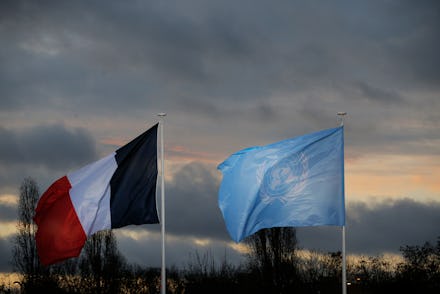Donald Trump tweeted that the UN has become a social club. Here's what it actually does.

On Monday, President-elect Donald Trump tweeted, "The United Nations has such great potential but right now it is just a club for people to get together, talk and have a good time. So sad!"
Trump's criticism comes on the heels of the passage of a U.N. resolution calling on Israel to cease building settlements in the West Bank, which is currently Palestinian territory. Before the 14-0 vote in favor of the resolution, Trump called it "unfair" to Israelis and sent an ominous tweet:
While Trump's foreign policy experience is limited to his clothing lines and conflicts of interest stemming from his business dealings around the world, his accusation that the U.N. is "just a club for people to get together, talk and have a good time" is a gross simplication of what the U.N. does . The U.N., which was established following the Holocaust, focuses on developing and maintaining "international peace and security" and "friendly relations among nations."
Far from Trump's portrait of the U.N. as "just a club" for people to "have a good time," in the broadest strokes, the U.N. works to protect universal human rights.
The U.N. works extensively in all aspects of human rights.
The U.N. was founded in 1945 as a reaction to the stark need created by World War II. The following year, the U.N. created the United Nations Children's Fund (UNICEF) to assist children in need of food, clothing and health care following World War II. In 1965, UNICEF was awarded the Nobel Peace Prize for "promoting brotherhood among the nations and for realizing that children provide the key to the future." Today, UNICEF operates in more than 190 countries, providing winter clothes to children in war-ravaged Aleppo, promotes gender equality, and has created and established programs throughout the world to reduce child malnutrition. According to a 2013 report, UNICEF estimates it's saved the lives of more than 90 million children.
In 1948, the U.N. created the Universal Declaration of Human Rights, with a pointed focus on "the dignity and worth of the human person and in the equal rights of men and women." The first article of the Declaration states:
All human beings are born free and equal in dignity and rights. They are endowed with reason and conscience and should act towards one another in a spirit of brotherhood.
Since then, the 193 Member States of the U.N. have established international and economic sanctions against people and countries that violate or threaten to violate human rights, thoroughly supports gay rights and classifies a lack of access to abortion as "torture." The group has closely monitored the Syrian civil war and plans to create a team to investigate accusations of war crimes and human rights abuses committed by Assad's government.
The World Health Organization (a U.N. agency, created in 1948) spearheaded efforts to eradicate smallpox. By 1980, WHO declared smallpox extinct. By 1996, an AIDS epidemic was sweeping the globe – and the U.N. stepped up to establish UNAIDS, a joint U.N. program to combat HIV and AIDS around the world.
The U.N.'s UNFCCC, Kyoto Protocol and the Paris Climate Agreement are the largest unified effort to combat climate change.
The UNFCCC, or United Nations Framework Convention on Climate Change, was "entered into force" (approved by the member states of the United Nations) in 1994 to prevent "dangerous human interference with the climate system." While the UNFCCC doesn't have legally binding power, it helps boost cooperation and communication between countries to improve wildlife conservation and reduce harmful emissions.
In 1997, the UNFCCC adopted the Kyoto Protocol, an international agreement committing U.N. member states to "setting internationally binding emission reduction targets." The Kyoto Protocol, which was entered into force in 2005, and its first "commitment period" began in 2008. The UNFCCC notes that during that time, 37 "industrialized countries and the European Community" committed to reducing greenhouse gas emissions by "an average of 5% against 1990 levels." That period ended in 2012, and at the start of a new period from 2013 to 2020, UNFCCC parties committed to reduce greenhouse gas emissions "by at least 18% below 1990 levels."
The Paris Climate Agreement, ratified in October 2016 and entered into force on November 4th, 2016, is an extension and amplification of the ambitions of the Kyoto Protocol. Its goal is to "strengthen the global response to the threat of climate change" and "pursue efforts to limit the [global] temperature increase."
UNODA and the U.N.'s NPT helped reduce the threat of a nuclear war.
On November 30th, 2016, the U.N. imposed the "toughest ever" sanctions on North Korea following its fifth nuclear test of the year. In response, North Korea has threatened "imminent war," calling the sanctions "as good as a declaration of war." Beyond North Korea, however, the U.N.'s focus on disarmament and limitation has been widely embraced.
The Treaty on the Non-Proliferation of Nuclear Weapons (NPT) was the U.N.'s first resolution, adopted in January 1946 and entered into force in 1970. The NPT's purposes were threefold: to "prevent the spread of nuclear weapons," to promote cooperation in the peaceful uses of nuclear energy" and "to further the goal of ... nuclear disarmament."
The NPT, through the United Nations Office for Disarmament Affairs (UNODA), has prompted nuclear-armed nations to "voluntarily [agree] to give up their atomic weapons." According to the U.N., more countries have agreed to the terms of the NPT more "than any other arms limitation and disarmament agreement, a testament to the Treaty's significance."
All told, the many branches of the U.N. and the work it does around the globe leaves little time for people to "get together, talk and have a good time."